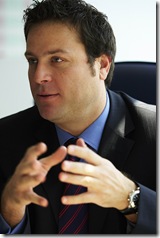The rising fortunes of mobile satellite services (MSS) company Inmarsat in recent years has been powered in many respects by its strong performance in emerging markets, not least the Middle East, Africa and Asia Pacific region.

Samer Halawi embodies Inmarsat’s desire to establish lasting relationships.
This wider geographic area, was until recently, under the responsibility of Samer Halawi in his role as vice president. In many respects he is the embodiment of Inmarsat’s desire to establish lasting relationships, with the market having nurtured strategic alliances with more than 500 partners in around 180 countries across the three territories.
Earlier this year Halawi was promoted to the position of VP for corporate structure development, and says this role will see him being responsible for seeking and developing alliances with different types of companies. For instance, the area of Ancillary Terrestrial Component (ATC) is one that Halawi is interested in maximising the opportunity for.
“ATC is a hybrid MSS and terrestrial system that allows for the extension of mobile satellite services through repeaters,” explains Halawi. “It is a type of terrestrial expansion and brings MSS to the millions of mobile subscribers that mobile operators service.”
The growth of in-flight mobile communications is another area that Halawi expects to see greater traction for Inmarsat as more airlines adopt the technology. The company’s SwiftBroadband offering is designed to meet the demand for more bandwidth across all areas of aviation – as well as delivering high-quality voice communications in an aeronautical environment.
“More commercial airlines are jumping on the bandwagon for in-flight communications, and that should continue to grow. We expect to extend the aero business with the addition of text and Blackberry connectivity,” Halawi says.
Inmarsat’s Broadband Global Area Network (BGAN) service has developed to become a well-regarded communications tool, which counted 18,500 subscribers at the end of March, having added over 2,600 subscribers during the first three months of this year alone.
Last year Inmarsat took a bold step into the voice market, and in June announced it had signed an exclusive agreement with Axiom Telecom, the Dubai-based retailer and distributor of mobile communications products, to manage the global distribution of Inmarsat’s mobile and fixed satellite phones.
The agreement formed a core component of Inmarsat’s go-to-market strategy for its handheld satellite phones, which are available through Inmarsat’s distribution partners. Axiom Telecom supports the Inmarsat channel as the exclusive logistics and repair partner for the satellite company’s voice services.
Inmarsat launched voice services in October 2007, with service coverage initially available across the Middle East, Asia and Africa.
“The agreement is a milestone for Inmarsat as it represents the first exclusive collaboration of its kind for the company on a global level and with a Middle East based company, which demonstrates Inmarsat’s commitment to the region and belief in the regional companies on the global landscape,” commented Halawi.
The handset satellite voice market stands at around US$350 million a year and that this figure is expected to grow to US$500 million by 2010, with Inmarsat expecting to target a 10 per cent market share by that time.
Given all these activities, Halawi says for the moment, Inmarsat is quietly developing its strategy and achieving its goals, with the expectation that some significant announcements will be made in due course.
“Things are very busy for me at the moment. Lots of travel and interaction with the market, and we are delivering on our promises,” Halawi comments. “We are now making a bigger push into newer markets and are also interested in addressing the needs of specific sectors such as construction, finance and mining.”





0 comments ↓
There are no comments yet...Kick things off by filling out the form below.
Leave a Comment